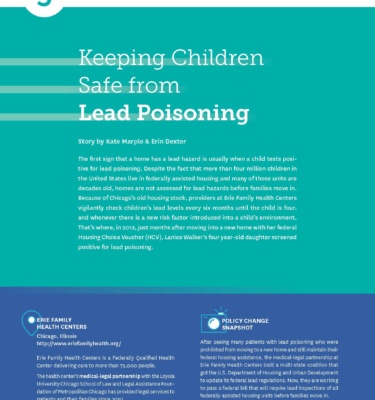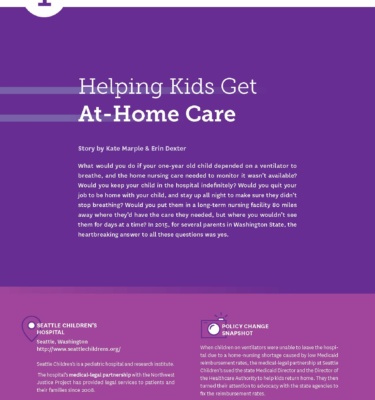Wednesday, April 18, 2018
After seeing many patients with lead poisoning who were prohibited from moving to a new home and still maintain their federal housing assistance, the medical-legal partnership at Erie Family Health Centers built a multi-state coalition that got the U.S. Department of Housing and Urban Development to update its federal lead regulations. Now, they are working to pass a federal bill that will require lead inspections of all federally assisted housing units before families move in....Read More
Wednesday, April 11, 2018
The moment you’re exposed to the HIV virus, a clock starts ticking. You have 72-hours to begin taking medication that greatly reduces your risk of contracting the virus, and the sooner you start taking it, the more effective it is. Whitman-Walker Health’s medical-legal partnership worked with insurance companies to remove requirements forcing Post-Exposure Prophylaxis medications to be filled by mail. By doing so, they ensured people who were exposed to the HIV virus could get the medication they needed filled at a local pharmacy within the 72-hour window when the drug can be effective in preventing the transmission of HIV....Read More
Wednesday, April 4, 2018
When children on ventilators were unable to leave the hospital due to a home-nursing shortage caused by low Medicaid reimbursement rates, the medical-legal partnership at Seattle Children’s sued the state Medicaid Director and the Director of the Healthcare Authority to help kids return home. They then turned their attention to advocacy with the state agencies to fix the reimbursement rates....Read More
Wednesday, October 18, 2017
Article outlines how, why, and to what degree social determinants of health screening practices are used across MLPs. It finds that, despite the importance of identifying patients’ social and legal needs in order to improve health, systematic, protocol-driven screening is not yet being used to its fullest extent within these organizations....Read More



